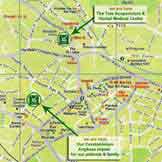|
Neuro Acupuncture and Ancestral Formula Chinese Herbal Medicine |
|
|
| --> |
|
|
|
|
|
Pleuropulmonary Blastomas (PPBs)
|
|
|
|
| What is Pleuropulmonary Blastomas or PPBs? |
|
Pleuropulmonary blastoma is a rare cancer that usually can be found in infant and young children. It is form in the tissue of the lung and pleura which covers the lung and the lines inside of the chest. The late-stage tumor will be solid and can spread to the brain. Even though you using surgical removal, the tumor may recur or spread.
There are four types of PPB:
- Type I: It consists of cysts (air pockets) that show it is cancerous, but it difficult to find and diagnose in the early form. Usually found in young children with average 10 months old. Chance to successfully treated is better than Type II and Type III.
- Type Ir: This type of PPB is similar to Type I but it does not have cancerous cells where the letter “r” mean regressing.
- Type II: This Type II PPB contains both cysts and cancerous nodules. It usually occurs in 3 years old children.
- Type III: This is the most serious stage because it contain solid cancerous tumor. Children around 4 years old commonly being the victim.
| Pleuropulmonary Blastomas (PPB) Symptoms |
Sometimes, children with pleuropulmonary blastomas (PPB) do not show any symptoms or signs but usually children who suffer from PPB will experience sudden, stressful breathing which caused by air escaping from the lung cysts into the chest cavity. Besides that, the children may feeling unwell, fever, cough, and pain in the chest. These symptoms are very non-specific. It can be caused by other types of tumor in the lung or by other condition too.
| Pleuropulmonary Blastomas (PPB) Causes |
Actually, the real cause of PPB is unknown yet. Like other childhood cancer, PPB may appear "out of the blue" without any clue of what caused it.
|
Please feel free to contact or email us for further details at : |
THE TOLE ACUPUNCTURE & HERBAL MEDICAL CENTRE SDN BHD.
Lot 2.01, 2nd Floor,
Medical Specialist Floor,
Menara KH (Menara Promet),
Jalan Sultan Ismail, 50250 Kuala Lumpur.
Malaysia
Tel No : +603-21418370 / +603-21451671
Whatsapp (only): +6012-7688284
Acupuncture Time : |
| Operating Hours : |
| Monday : 10AM - 6PM |
| Tuesday : 1PM - 7PM |
| Wednesday to Saturday : 10AM - 7PM |
| Sunday : 12PM - 4PM |
| *(Malaysia Time) |
| |

|
|
|
|
|
 |
Easiest way to reach us, click below! |
|
|
| |
We can send herbs to your home by: |
|
|
| |
We accept the following payment options in our centre. For Online Payment, please use Direct Transfer. |
|
|
| |
The Tole's Opening Ceremony |
Our New Acupuncture Centre was officially open by our Health Minister YAB Dato' Lee Kim Sai on 31st January 1993. |
YAB Dato' Lee Kim Sai and Dato' Leong Hong Tole (D.S.T.M) - [World Known as MasterTole] |
|
|
|
| |
| |
Share us with your friends. |
They may need our assistance! |

LIKE OUR FACEBOOK PAGE! |
| |

FOLLOW OUR TIKTOK PAGE! |
| |

FOLLOW OUR INSTAGRAM PAGE! |
| |
|
| |
The Star News |
|
|
The Star Newspaper report on Our Master's Acupuncture and Herbal TCM on 5th February 2011, Saturday. |
|
|
| |
Online Order Sabah Snake Grass Herbs |
|
|
We are one of the suppliers for Sabah Snake Grass herbs and also others Chinese herbs. |
|
|
| |
|
|
 The Tole Officially Opened by our Health Minister. The Tole Officially Opened by our Health Minister.
- Acupuncture Centre
|
|
|
| |
|
Contact Us
Neuro Acupuncture and Herbal Medicine |
THE TOLE
ACUPUNCTURE-HERBAL MEDICAL CENTRE SDN BHD
Lot 2.01, 2nd Floor, Medical Specialist Floor, Menara KH (Menara Promet), Jalan Sultan Ismail, 50250 Kuala Lumpur
Tel: +603-21418370
+603-21451671
Whatsapp (only): +6012-7688284
| Acupuncture Time : |
Operating Hours : |
Mon : 10AM - 6PM |
Tue : 1PM - 7PM |
Wed to Sat : 10AM - 7PM |
Sun : 12PM - 4PM |
*(Malaysia Time) |
| |
* E-mail consultation with Master and Assistant.
Ask by e-mail

|
|
|
| |
Accommodation Kuala Lumpur
Neuro Acupuncture and Herbal Medicine |
|
CONDOMINIUM |
|
| |
|
|
| |
|
| |
|
| |
Easiest way to reach us, click below! |
|
|
| |
|
|